
Trazodone for Dogs: Uses, Dosage, Side Effects, and Alternatives
Overview
Trazodone is a valuable option for our beloved dogs, particularly when they face anxiety-related challenges such as separation anxiety or noise phobias. It can also support their recovery after surgery, acting as a serotonin antagonist and reuptake inhibitor. Understanding that our pets can experience distress just like we do, this medication helps elevate serotonin levels, stabilizing their mood and providing them with a sense of calm.
In addition, the article provides essential dosage guidelines, outlines potential side effects, and discusses alternative treatments, empowering pet owners to make informed decisions about their dog’s emotional health. By addressing these concerns, we can ensure our furry companions receive the care and support they truly deserve.
Introduction
In the world of pet care, recognizing the subtle complexities of anxiety management in our beloved dogs is vital for nurturing their emotional well-being. Many pet owners find themselves deeply concerned about their furry friends who experience anxiety, whether it stems from separation or fear of loud noises.
Trazodone, a serotonin antagonist and reuptake inhibitor, has become a trusted ally in addressing these anxiety-related challenges. This medication provides a pathway to calmness and stability, helping dogs feel more secure in their environment.
Yet, navigating the intricacies of dosage, potential side effects, and alternative treatments can be daunting for pet owners striving to provide the best care possible.
This article aims to explore:
- The purpose and mechanism of action of trazodone
- Its specific applications in treating various conditions
- The importance of vigilant monitoring
Together, we can enhance our pets’ quality of life, ensuring they receive the love and support they deserve.
Define Trazodone: Purpose and Mechanism of Action
Trazodone for dogs acts as a serotonin antagonist and reuptake inhibitor (SARI), primarily designed to help our beloved pets cope with stress and behavioral disorders. As pet owners, we understand how deeply our furry friends can feel anxiety and worry. Trazodone works by elevating serotonin levels in the brain, which plays a crucial role in stabilizing mood and alleviating distress. Trazodone for dogs is often recommended for conditions such as:
- Separation anxiety
- Noise phobias
- Post-surgical recovery
where a calming effect can make a world of difference. By grasping how trazodone for dogs functions, pet owners can truly appreciate its contribution to their dog’s emotional health and comfort during challenging times. We all want our pets to feel safe and secure, and knowing that there are supportive options available can bring peace of mind.
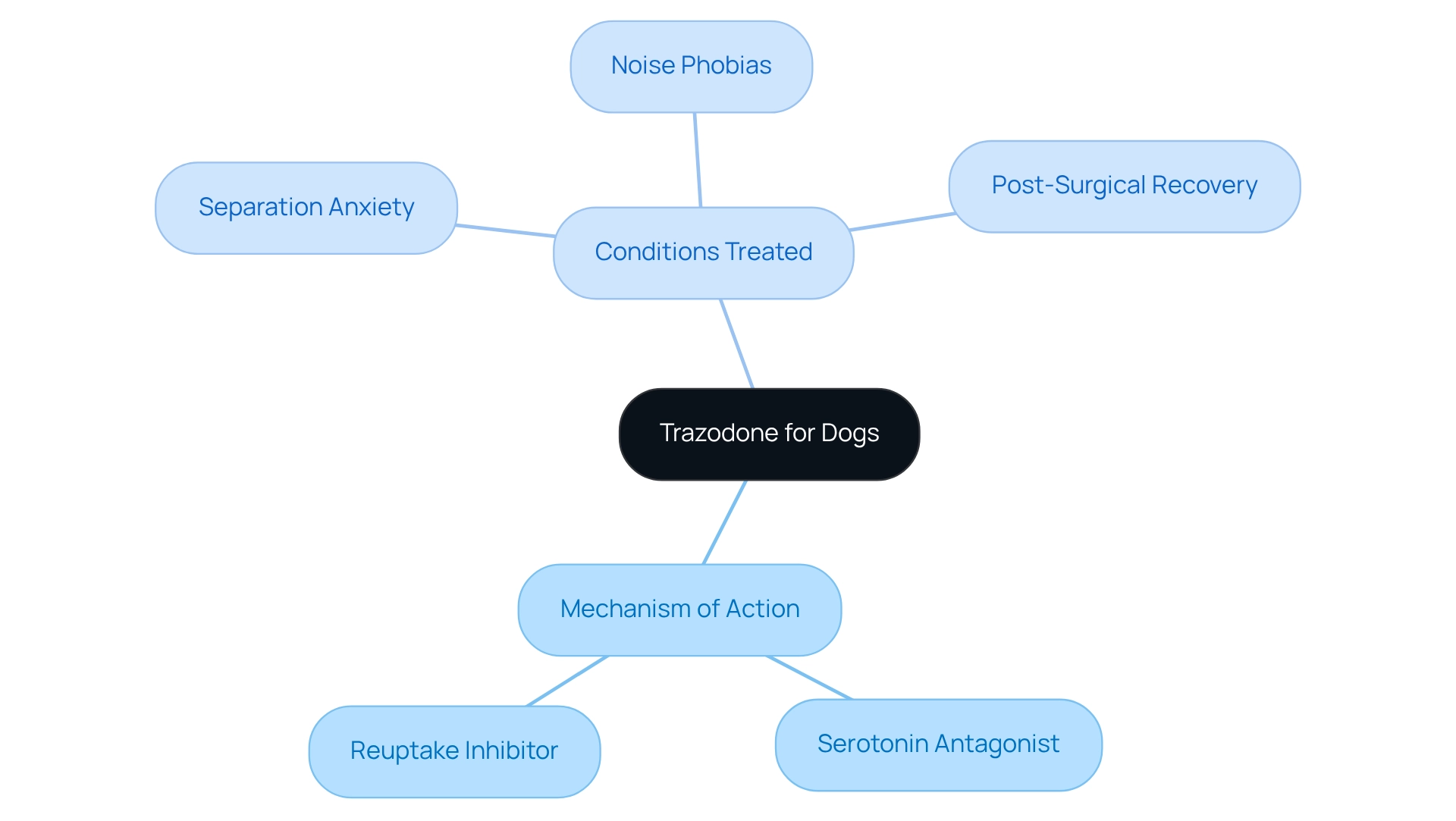
Explore Trazodone Uses in Dogs: Conditions Treated
Trazodone for dogs acts as a compassionate ally in managing various anxiety-related conditions in our beloved pets. Many pet owners experience heartache when their furry friends struggle with anxiety, and it’s essential to recognize these challenges. For instance, separation anxiety can leave dogs feeling distressed when left alone, while noise phobias can make them fearful of loud sounds, such as thunderstorms or fireworks. Generalized anxiety can manifest in various situations, leaving our pets feeling uneasy and unsettled.
Additionally, during post-surgical recovery, trazodone for dogs can provide soothing support, promoting a smoother healing process. By addressing these concerns, trazodone for dogs plays a vital role in enhancing the quality of life for anxious canines. It’s comforting to know that there are options available to help our pets feel more secure and at ease. As pet owners, we want nothing but the best for our furry companions, and understanding the tools we have at our disposal can make all the difference in their emotional well-being.
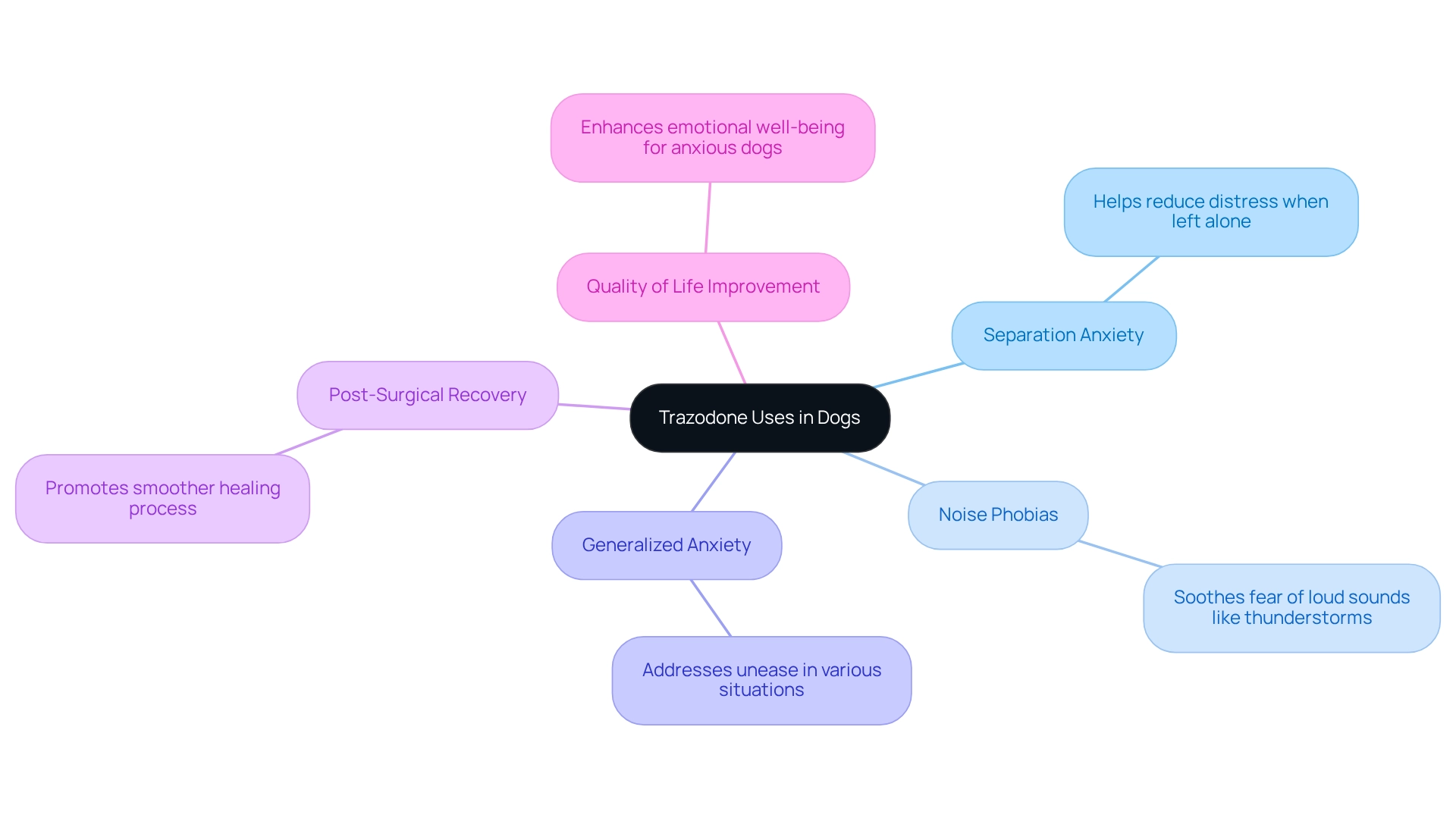
Determine Trazodone Dosage for Dogs: Guidelines and Considerations
Determining the right dosage of medication for your beloved canine is crucial and depends on several factors, including your dog’s weight, age, and specific anxiety condition. It’s understandable to want the best for your furry friend, and ensuring they receive the appropriate care is a vital part of that. Here are some general guidelines to consider:
- Small Dogs (<22 lbs): Begin with 25-50 mg every 8-24 hours.
- Medium Dogs (22-44 lbs): 50-100 mg every 8-24 hours.
- Large Dogs (44-88 lbs): 100-200 mg every 8-24 hours.
- Extra Large Dogs (>88 lbs): 200-300 mg every 8-24 hours.
Always remember, before starting any medication, it’s essential to consult with a veterinarian. They can help ensure that the dosage is appropriate for your dog and monitor for any potential side effects. Your pet’s health and happiness are paramount, and with the right guidance, you can provide them with the care they deserve.
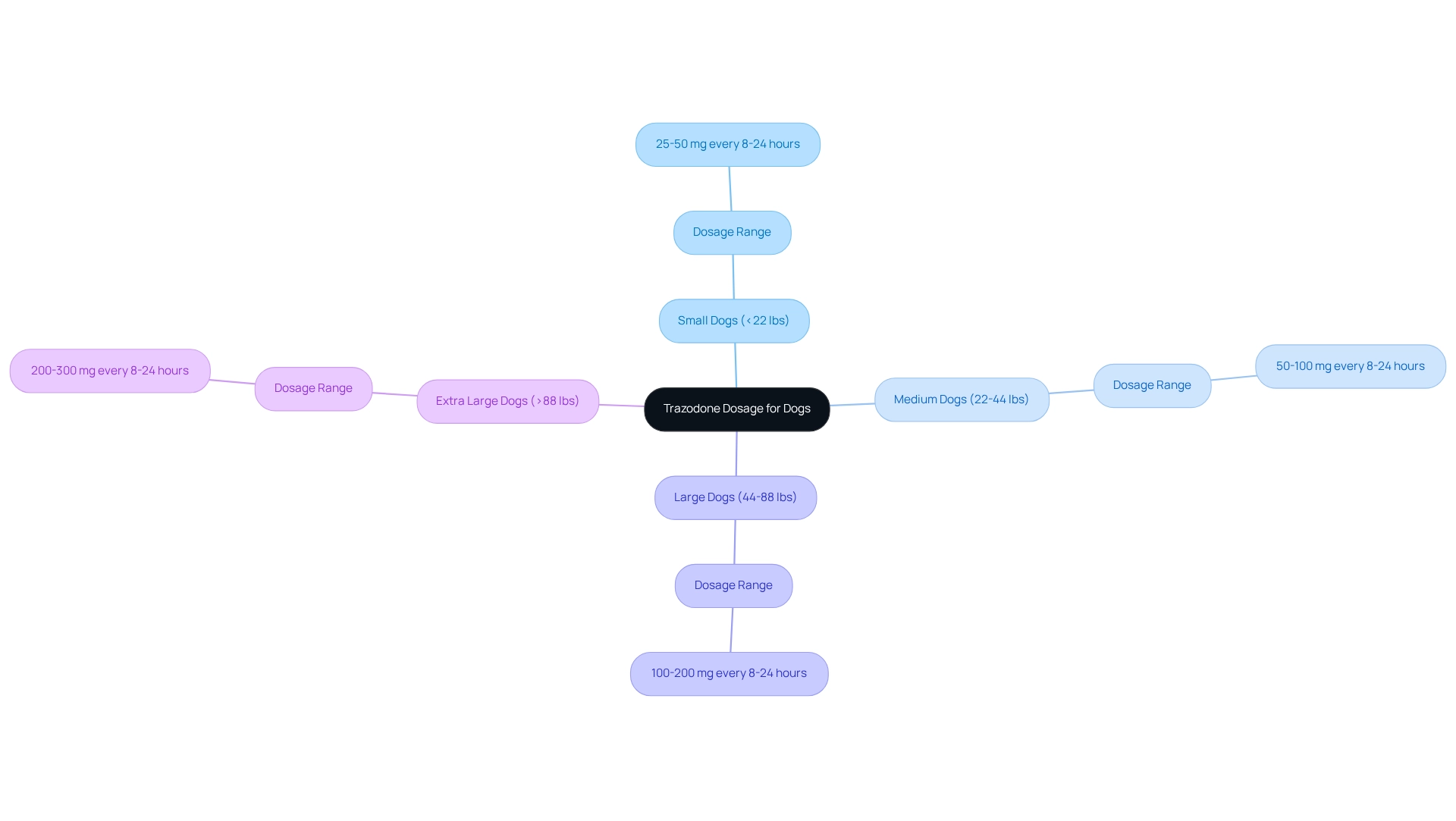
Identify Trazodone Side Effects in Dogs: What to Watch For
While trazodone for dogs is generally regarded as safe for canines, it is essential for pet owners to observe possible side effects with great care. We understand how much you love your furry friends, and being aware of their well-being is paramount. Common side effects may include:
- Sedation: Your dog might experience excessive drowsiness or lethargy, which can last for several hours. It’s important to note that owner-observed effects have been reported to last four hours or more, underscoring the need for careful monitoring during this time.
- Gastrointestinal Issues: Symptoms such as vomiting, diarrhea, or decreased appetite may arise, necessitating attention to any dietary changes.
- Behavioral Changes: Some dogs may show increased anxiety or agitation, which can be concerning for loving owners like you.
- Cardiovascular Effects: Changes in heart rate or rhythm can occur, warranting vigilant observation.
In severe cases, side effects such as seizures or difficulty breathing require immediate veterinary attention. Regular consultations with a veterinarian are vital for managing any risks associated with trazodone for dogs. Awareness of serotonin syndrome is especially crucial, as it can pose serious and potentially life-threatening challenges. Monitoring for clinical signs linked to this syndrome is essential for effective management. Recognizing symptoms associated with serotonin syndrome is important, as it can be a severe condition to navigate.
Real-life instances remind us of the need for caution; canines exposed to high amounts of certain medications have faced serotonin syndrome, with varying outcomes. Early recognition and treatment can lead to recovery, emphasizing the importance of being proactive in monitoring your pet’s reactions to this medication. The ASPCA’s Animal Poison Control Center (APCC) highlights the significance of clinical toxicology training to safeguard and enhance animal lives, reinforcing the necessity for informed pet care. We are all in this journey together, and your vigilance can make a world of difference for your beloved companion.
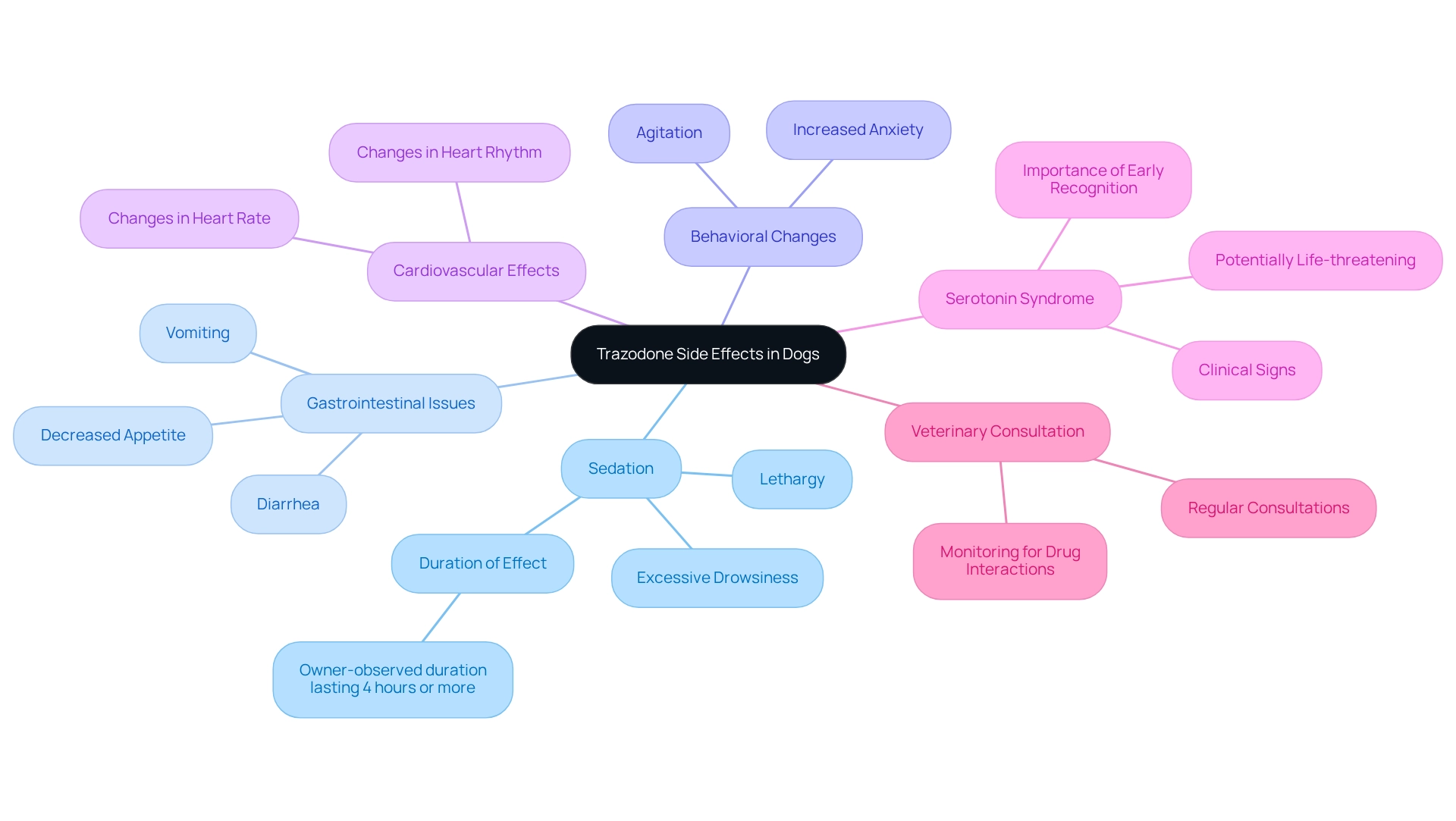
Consider Alternatives to Trazodone: Natural and Medical Options
For pet owners who are exploring alternatives to trazodone, it’s essential to know that there are various natural and medical options available to effectively manage anxiety in dogs. Understanding your furry friend’s needs is the first step toward ensuring their well-being.
Natural Supplements: Many pet parents find comfort in knowing that ingredients like L-theanine, melatonin, valerian root, and CBD are recognized for their calming properties. Recent studies suggest that CBD may be particularly beneficial for alleviating stress in dogs, offering a practical choice for managing nervousness without causing sedation.
Behavioral Therapy: Collaborating with a qualified trainer or behaviorist can help address the root causes of your dog’s distress through positive reinforcement methods. Dr. Jaime Sage, president of the CT/MRI society of the American College of Veterinary Radiology, emphasizes how personalized behavioral strategies can make a difference, drawing from his extensive experience in veterinary care. This approach not only helps your dog but also nurtures the bond you share.
Other Medications: In some cases, veterinarians might prescribe alternatives such as fluoxetine (Prozac) or clomipramine (Clomicalm) for more prolonged stress management. This tailored approach ensures that your dog receives the specific care they need, reflecting the unique nature of their anxiety.
Environmental Modifications: Enhancing your dog’s surroundings with calming music, pheromone diffusers, or designated quiet areas can significantly lower their stress levels. A case study titled “Impact of CBD on Aggressive Behaviors in Shelter Dogs” found that while CBD reduced aggressive behaviors, it also highlighted the selective efficacy of natural supplements in managing specific behavioral issues. This insight can guide you in creating a nurturing environment for your beloved pet.
Consulting with a veterinarian is crucial in identifying the most suitable strategy for your dog’s unique situation. This step ensures a comprehensive approach to anxiety management, allowing you to provide the loving care your furry companion deserves.
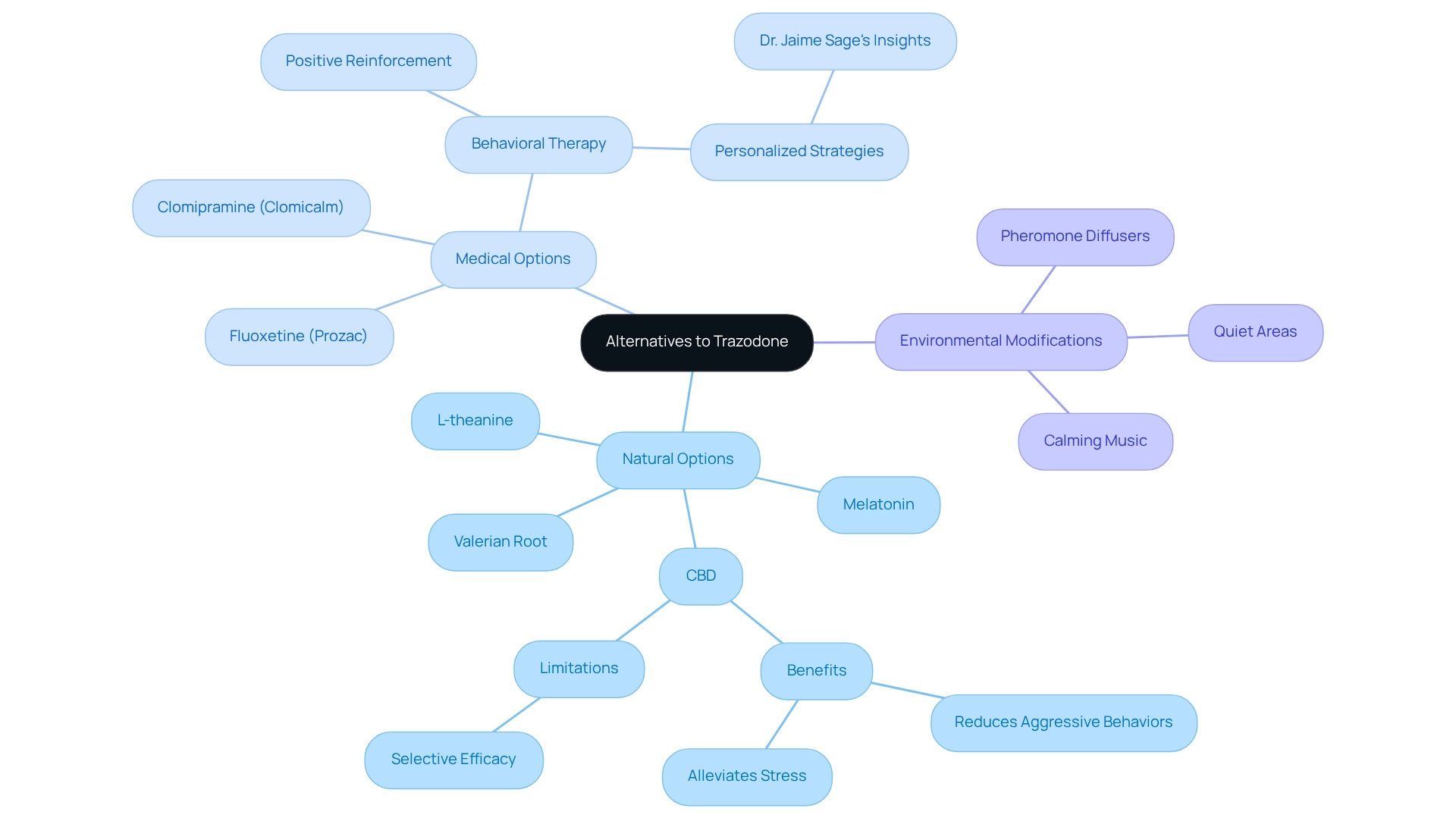
Conclusion
Trazodone has emerged as a valuable ally in managing anxiety in our beloved dogs, thanks to its ability to enhance serotonin levels and provide a calming effect. It’s important to understand its purpose and mechanism of action, as this knowledge illuminates how this medication can effectively address various anxiety-related conditions, such as separation anxiety and noise phobias. By utilizing trazodone, pet owners can significantly improve their dogs’ emotional well-being, ensuring they feel secure and at ease in their environments.
However, the responsible use of trazodone requires careful consideration of dosage guidelines and potential side effects. It’s essential to monitor for common issues like sedation and gastrointestinal disturbances, as well as to be aware of more severe conditions such as serotonin syndrome. Regular veterinary consultations can help manage these risks, empowering pet owners to make informed decisions about their dog’s treatment.
For those exploring alternatives to trazodone, a variety of natural and medical options are available. From behavioral therapy and environmental modifications to supplements like CBD, these alternatives can complement or even replace trazodone, depending on the unique needs of each dog. Ultimately, the goal remains the same: to enhance the quality of life for anxious dogs through effective and compassionate care. By prioritizing their pets’ emotional health, owners can create a nurturing environment that fosters happiness and stability.

